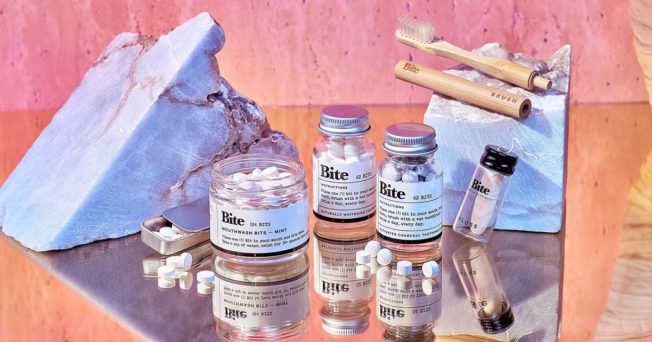Working as a TV producer meant that Lindsay McCormick had to spend a lot of time living out of a suitcase. Much of that life included squeezing toiletries into a quart-size bag.
A longtime vegan trying to live a low-waste lifestyle, McCormick was frustrated that the only travel toothpaste option required a throwaway, plastic container. She didn’t want to add yet more waste to the estimated 1.5 billion consumer products that end up in landfills each year.
So in 2017, she decided to make her own.
“I could refill my shampoo and conditioner and even my sunscreen, but I was throwing this thing out,” McCormick, now CEO of Bite, explained to Adweek. “That was the beginning of Bite.”
Rethinking old habits
But that was only the very beginning. It took months of research, countless conversations with dental professionals and even a few open source, online chemistry courses to help shape the recipe that McCormick was concocting in her living room.
Throughout 2017, McCormick mixed powders together until she had a tablet that she was happy with. Rather than a paste that users squeeze out of a tube, they’d pop a small, mint-like tablet into their mouths before brushing, chew it up and then brush. The tablets come in a glass jar. And refills are delivered in compostable paper packages.
In 2018, McCormick started selling Bite toothpaste bits through Etsy. Just over three years later, it’s a full-fledged, eight-figure direct-to-consumer, subscription-based business with more than 100% year-over-year growth, she said.
In September, Bite expanded beyond dental products with the debut of its new deodorant line. It unveiled a new tagline at the same time, for which Bite is an acronym: “Because it’s the Earth.”

Meeting the demands of eco-conscious buyers
The plastic-free, low waste brand appeals to an expanding segment of consumers that are hyperaware of environmental issues—and that generally skew younger. Data from Forrester shows that fewer than one-fifth of buyers make decisions primarily based on social or environmental values. But that group of buyers is growing.
“Every consumer signal suggests that they will grow increasingly conscious about sustainability and the environment,” Dipanjan Chatterjee, vp and principal analyst at Forrester, told Adweek. “We may not be there yet, but soon enough many of these factors will cease to be differentiators and become costs of entry into the category.”
Chatterjee pointed to the trajectory of cruelty-free products, which are now the norm in many consumer packaged goods (CPG) product categories.

Is plastic the only problem?
But while single-use plastics pose major environmental problems—due to low recyclability within current recycling systems and the inevitability of exacerbating ocean pollution—plastic isn’t the only sustainability issue facing the CPG industry.
For example, plastic is a lot lighter than more durable and recyclable materials like glass or metal. Therefore, plastic requires less fuel to transport it.
“If you focus on plastic at the expense of everything else, that’s a problem,” said McCormick.
Bite aims to be transparent about each decision that it makes. The company tries to explain its rationale for what it does in blog posts when the issues are more complicated. But even though plastic isn’t the only consideration, McCormick is firm on her conviction to refrain from using it in any of the company’s products.
“We are just so massively dependent on single-use plastic,” she explained. “It requires an all-in effort to break the addiction before we can start being a little bit more holistic about it.”
A ‘highly differentiated’ product … for now
Bite’s part of a growing category of “green” CPG brands that aim to remake an industry dominated by major players like Procter & Gamble, Unilever and Colgate-Palmolive. These global brands established their dominance in the heyday of single-use plastics. But eco-conscious consumers have become more open to upstarts that are directly premised on addressing and minimizing environmental harm to the planet.
The CPG giants have made moves to improve recyclability and compostability, use more recycled plastic and decrease waste. But a quick peek down the personal care aisle at the drugstore is enough to prove that there’s a long way to go.
“Bite and its competitors are highly differentiated in this space today,” said Chatterjee, “but there are legacy consumer packaged goods companies with deeper pockets on the prowl, waiting to jump in if an opportunity threshold is crossed.”
When that happens, this new kind of toothbrushing will likely go mainstream, he added. “We’ll all be chewing tablets then.”










